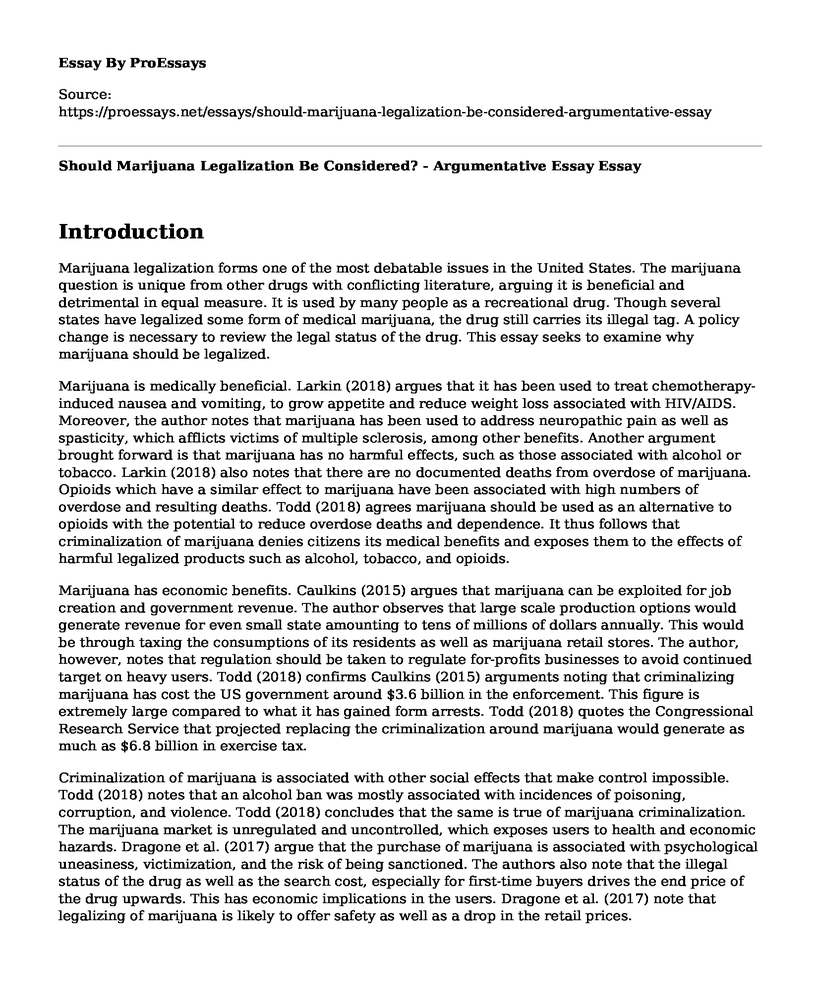Introduction
Marijuana legalization forms one of the most debatable issues in the United States. The marijuana question is unique from other drugs with conflicting literature, arguing it is beneficial and detrimental in equal measure. It is used by many people as a recreational drug. Though several states have legalized some form of medical marijuana, the drug still carries its illegal tag. A policy change is necessary to review the legal status of the drug. This essay seeks to examine why marijuana should be legalized.
Marijuana is medically beneficial. Larkin (2018) argues that it has been used to treat chemotherapy-induced nausea and vomiting, to grow appetite and reduce weight loss associated with HIV/AIDS. Moreover, the author notes that marijuana has been used to address neuropathic pain as well as spasticity, which afflicts victims of multiple sclerosis, among other benefits. Another argument brought forward is that marijuana has no harmful effects, such as those associated with alcohol or tobacco. Larkin (2018) also notes that there are no documented deaths from overdose of marijuana. Opioids which have a similar effect to marijuana have been associated with high numbers of overdose and resulting deaths. Todd (2018) agrees marijuana should be used as an alternative to opioids with the potential to reduce overdose deaths and dependence. It thus follows that criminalization of marijuana denies citizens its medical benefits and exposes them to the effects of harmful legalized products such as alcohol, tobacco, and opioids.
Marijuana has economic benefits. Caulkins (2015) argues that marijuana can be exploited for job creation and government revenue. The author observes that large scale production options would generate revenue for even small state amounting to tens of millions of dollars annually. This would be through taxing the consumptions of its residents as well as marijuana retail stores. The author, however, notes that regulation should be taken to regulate for-profits businesses to avoid continued target on heavy users. Todd (2018) confirms Caulkins (2015) arguments noting that criminalizing marijuana has cost the US government around $3.6 billion in the enforcement. This figure is extremely large compared to what it has gained form arrests. Todd (2018) quotes the Congressional Research Service that projected replacing the criminalization around marijuana would generate as much as $6.8 billion in exercise tax.
Criminalization of marijuana is associated with other social effects that make control impossible. Todd (2018) notes that an alcohol ban was mostly associated with incidences of poisoning, corruption, and violence. Todd (2018) concludes that the same is true of marijuana criminalization. The marijuana market is unregulated and uncontrolled, which exposes users to health and economic hazards. Dragone et al. (2017) argue that the purchase of marijuana is associated with psychological uneasiness, victimization, and the risk of being sanctioned. The authors also note that the illegal status of the drug as well as the search cost, especially for first-time buyers drives the end price of the drug upwards. This has economic implications in the users. Dragone et al. (2017) note that legalizing of marijuana is likely to offer safety as well as a drop in the retail prices.
Conclusion
The essay has argued the case on the legalization of marijuana. The arguments are based on the fact that marijuana is medically beneficial, has economic benefits and that criminalization has only served to worsen the situation. It thus follows that there is a need for policy change to legalize marijuana so as to reap the benefits it may offer.
References
Caulkins, J. P., Kilmer, B., Kleiman, M. A., MacCoun, R. J., Midgette, G., Oglesby, P., & Reuter, P. H. (2015). Options and issues regarding marijuana legalization. Rand Corporation. Retrieved from https://appam.confex.com/appam/2012/webprogram/ExtendedAbstract/Paper3417/Caulkins%2Cet%20al.%20submitted%20to%20APPAM.pdf
Dragone, D., Prarolo, G., Vanin, P., & Zanella, G. (2017). Crime and the legalization of recreational marijuana. Journal of Economic Behavior & Organization, 159, 488-501. Retrieved from http://ftp.iza.org/dp10522.pdf
Larkin Jr, P. J. (2018). Introduction to a Debate: Marijuana: Legalize, Decriminalize, or Leave the Status Quo in Place. Berkeley J. Crim. L., 23, 73. Retrieved from https://scholarship.law.berkeley.edu/cgi/viewcontent.cgi?article=1122&context=bjcl
Todd, T. (2018). The Benefits of Marijuana Legalization and Regulation. Berkeley J. Crim. L., 23, 99. Retrieved from https://scholarship.law.berkeley.edu/cgi/viewcontent.cgi?article=1124&context=bjcl
Cite this page
Should Marijuana Legalization Be Considered? - Argumentative Essay. (2023, Jan 25). Retrieved from https://proessays.net/essays/should-marijuana-legalization-be-considered-argumentative-essay
If you are the original author of this essay and no longer wish to have it published on the ProEssays website, please click below to request its removal:
- Law Essay Example: Gilbert Law Summaries on Constitutional Law
- Research Paper on Crime Prevention Programs
- Paper Example on Gun Laws
- Gun Control Government Policy: Why Not Ban Everything That Develops Prospective Threats?
- CBP: Securing US Trade Through Maritime Ports - Essay Sample
- Essay Sample on Technical Expertise: Reforming Juvenile System
- Essay Example on Death Penalty: Morality of Punishment in the US







